Outriders is what you’d get if Gears squeezed into an ill-fitting Destiny costume and I love it
We go hands-on with the RPG shooter that'll drop on PS5 and Xbox Series X and chat with Square Enix and People Can Fly
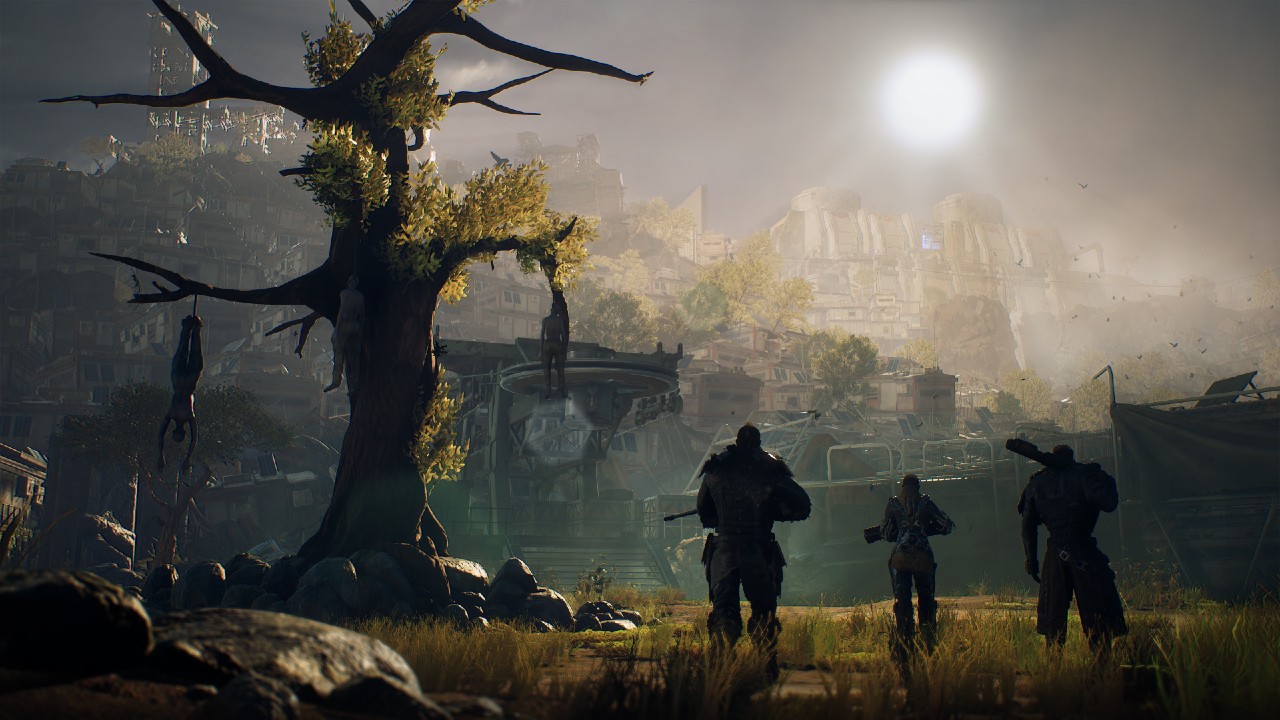
Outriders is what you might get if David Lynch made an RPG shooter, but only after spending the better part of the decade studying the intricacies of each respective genre. It's familiar but different, and sometimes surreal; Outriders isn't afraid to embrace its influences, or to contort them when it feels the need to.
In Outriders, you get Gears of War-style cover, a pool of powers designed to be used in tandem with firearms, a veritable smorgasbord of customizable gear and weaponry, and the satisfying uptick of numbers flying out of enemies' heads. There's military muscle facing an unknown entity with dry, Cool Guy retorts, the persistent threat from different alien species that all look like my varying sleep paralysis demons, and bloody, grimace-inducing death animations.
Sometimes it feels like Mass Effect, sometimes like Bulletstorm, and sometimes like Gears of War: Judgment in an ill-fitting Destiny cosplay. But when it hits right, Outriders feels like the legitimate love child of the best games of the last decade. If you've played any shooter this past generation, you'll find comfort in Outriders' design. But that comfort dissipates as the plot moves forward at a bizarre, breakneck pace, and as enemies grow more difficult mid-fight – two key features that makes it stand out from its immediate competition. That's thanks to a team that's ready and willing to prove it can make something bigger than the sum of its parts.
Small team, big dreams
"From the beginning, we were quite sure we wanted to make a shooter, mixed with an RPG, where the skills are the same level of importance as of the gun," Bartek Kmita tells me, eager to talk about Outriders following a further eight months of secrecy from its reveal at E3 2019. Kmita is the creative director at People Can Fly, the small Polish studio behind a litany of damn good shooters: the fast-paced and hilariously violent Bulletstorm, the refreshingly different Gears of War: Judgment, and the Painkiller series.
Now, the studio is hard at work on an RPG shooter coming at the turn of the generation, arriving on PS5 and Xbox Series X, as well as PC, PS4, and Xbox One, in time for Holiday 2020. There's no way People Can Fly could have predicted that it would be driving the next-generation of live-service co-op games when Outriders first entered production in 2016. Back then, the game was being developed by a 30 person team that had an almost dogged devotion to the small, core idea that Kmita mentioned before – to creating an action game that put an equal weighting on the shooting as it did superhuman powers.
It's an idea that would eventually entice Square Enix to invest, with the publisher's support propelling that small development team from 30 to over 200 in just two years to match a rising ambition. "Three years ago, I thought this was an indie game that I was signing on to write," laughs Joshua Rubin, lead writer of Outriders. "It doesn't feel like an indie game. Because of Square [Enix] coming in and seeing how ambitious this could be, it really allowed this game to get bigger and bigger and richer and deeper."
Skills and thrills abound
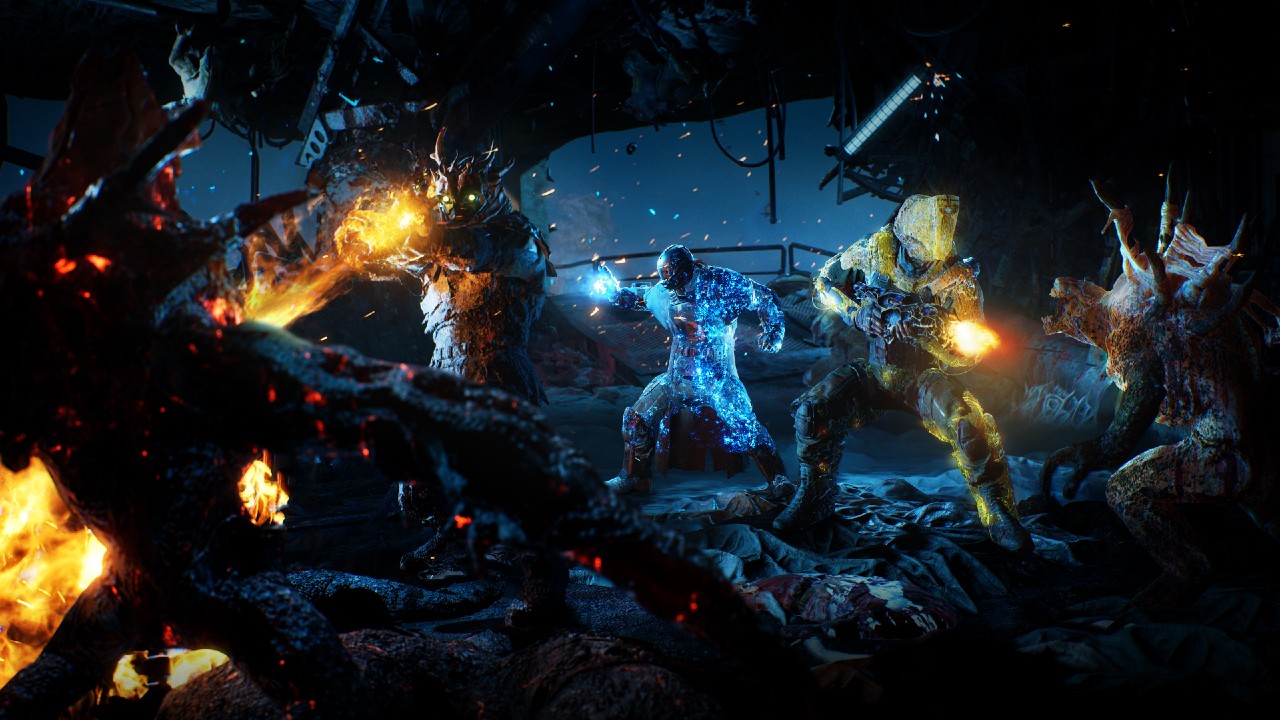
"This is a game full of shocks and surprises," Rubin warns, and I quickly get a sense of that once I'm able to get my hands on the game. You, an Outrider, have come to a planet called Enoch along with a party of researchers and scientists, all of whom seek to colonize it after Earth's destruction.
Sign up to the GamesRadar+ Newsletter
Weekly digests, tales from the communities you love, and more
But Enoch has other plans. A strange power known as the Anomaly emanates from the planet – that power spawns savage energy storms that thrash its landscapes and influence its wildlife. When the Anomaly storms smash into the Outriders and company, members of the team are either completely destroyed or irreversibly altered. Before your Outrider realizes they have been imbued with some serious space energy, however, they're shoved back into cryosleep, only to wake 30 years later to a changed planet and a changed self.
Thanks to the Anomaly, you can choose from one of three classes: Pyromancer, a mid-range fighter that uses volcanic energy to create walls of flames; Tricksters, close-range brawlers that manipulate time and space; and Devastators, tanks that use Enoch's energy for brute force. There's a fourth class, but People Can Fly wouldn't speak about it (yet).
I played as the Pyromancer, and there was a 15 second cooldown for my LB skill, which ripples the ground with lava, around 20 seconds for my RB, which shot forward a powerful wall of fire, and 45 seconds for my most powerful skill: temporarily encasing all surrounding enemies in ash. A steady combination of these skills and my weapons easily dispatched most of my enemies, and much of the skill in Outriders is born out of juggling the medley of cooldowns and tracking enemy movements across beautiful environments laden with waist-high cover.
In Outriders, you've got a virtually consistent stream of abilities used in tandem with hundreds of guns that have (according to Kmita) "countless" crafting and customization permutations. "We decided to use all our experience to create a product where you can play your way," says Kmita, who explains that, "If you want to play Gears of War style, a more cover-based shooter, you can. If the cover is not important for you, you can build your character this way. That was in the core of the design, to give people the possibility to play our game in different ways."
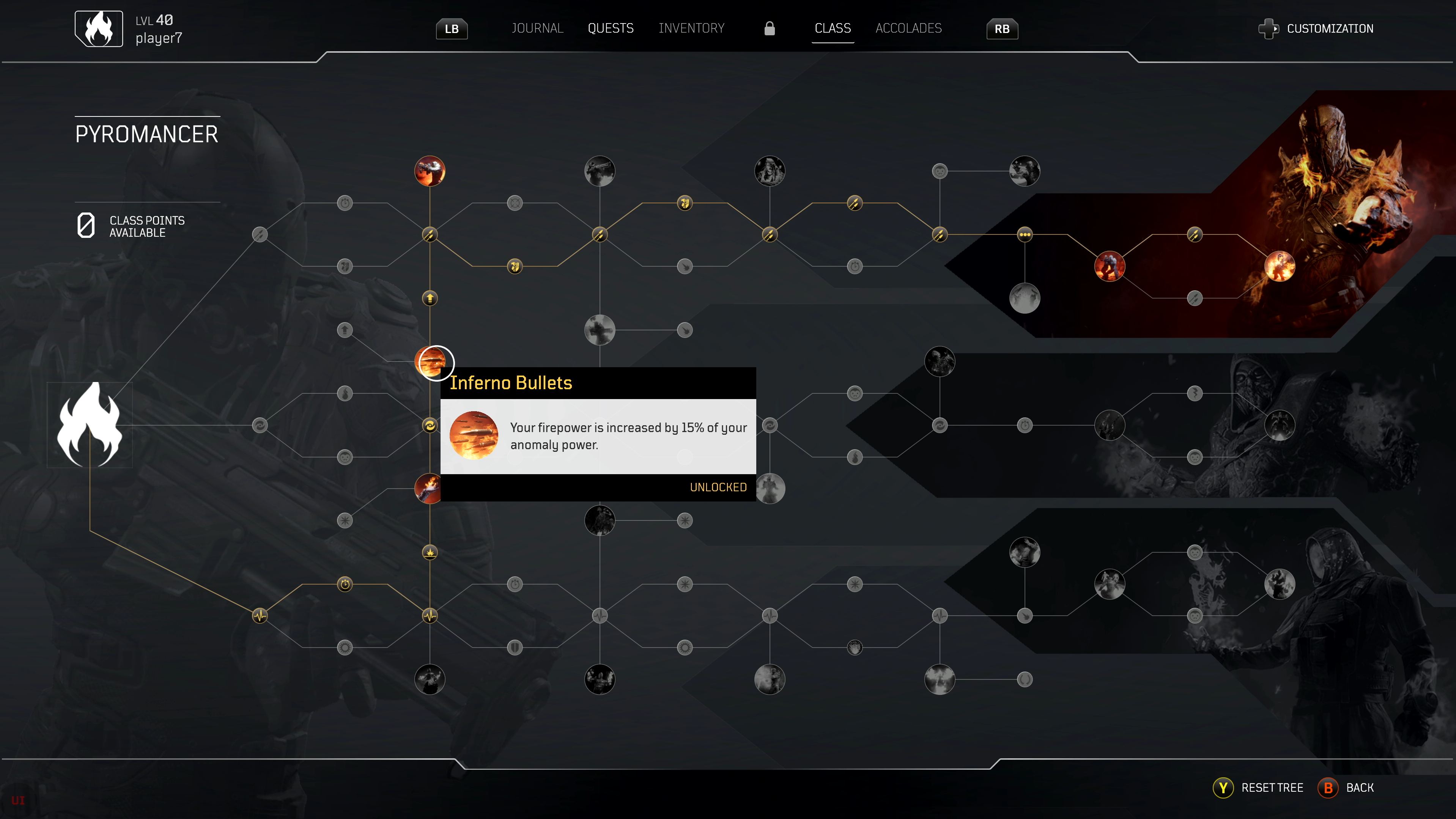
"Three years ago, I thought this was an indie game that I was signing on to write."
Joshua Rubin, lead writer
Outriders has been built with flexibility of playstyle in mind, and as a result it can feel like a bunch of different (good) games at once. Reflect with me, for a moment, on Mass Effect. Imagine the Vanguard class, which lets you harness biotic power while wielding weapons, and the changes implemented with Mass Effect 3 (Rolling to cover! Better cooldowns!) that made its combat the best in the trilogy. Now shift your mind to thinking about the Gears of War trilogy and its chest high walls and crunchy, weighty weapons. The combat in Outriders feels like an amalgamation of these two series: you're incredibly mobile and can choose to use cover or not (ignoring it won't constantly kill you, unlike in Gears), and your skills are powerful and cool down quickly (unlike in Mass Effect).
But neither of those games let you play through the campaign as a trio of genetically-modified warriors, and Outriders is purpose-built for co-op. Initially, I set off on my own instead of joining two other players, in a fatal mix of impatience and hubris. Outriders' difficulty is based on world tier, which flexes with you as you battle through the game. There's a bar in the top left corner of the screen that keeps track of your world tier. It fills as you fight, and if you're doing really well, it fills quicker. The higher the level, the higher the difficulty, so playing solo meant I did fairly well at the start, but by the time I got to an especially hard fight, I was struggling. It's a smart and subtle way of encouraging you to explore the hostile wastelands together, bonding with friends and strangers alike to make it through Outrider's most difficult scenarios.
So I admitted defeat and joined a Devastator and Trickster to run through the demo as a trio (although you do not need to bring one of each class into the fight, and parties can be composed of any mixture of character classes). As we played, I noticed our world tier was increasing at a much slower rate, and enemies were eating quite a few more bullets than when I was playing alone – it's worth noting that my teammates reported that their world tiers were ranking faster than when they were playing as a duo. Either way, the combination of our skills made gameplay so much more fun: the Tricksters would trap enemies in a time warp, and as their slowly-moving skeletons tried to advance, I'd chuck a wall of fire at them as the Devastator barreled through them. There was a lot of delighted screaming, and I can say with confidence you'll enjoy partying up with friends to take on Enoch and its enemies, more so than going it alone. Outriders is, after all, billed as an online-focused co-op RPG, and it's clear that you'll have the most fun playing it this way.
Finding your place in this strange new world
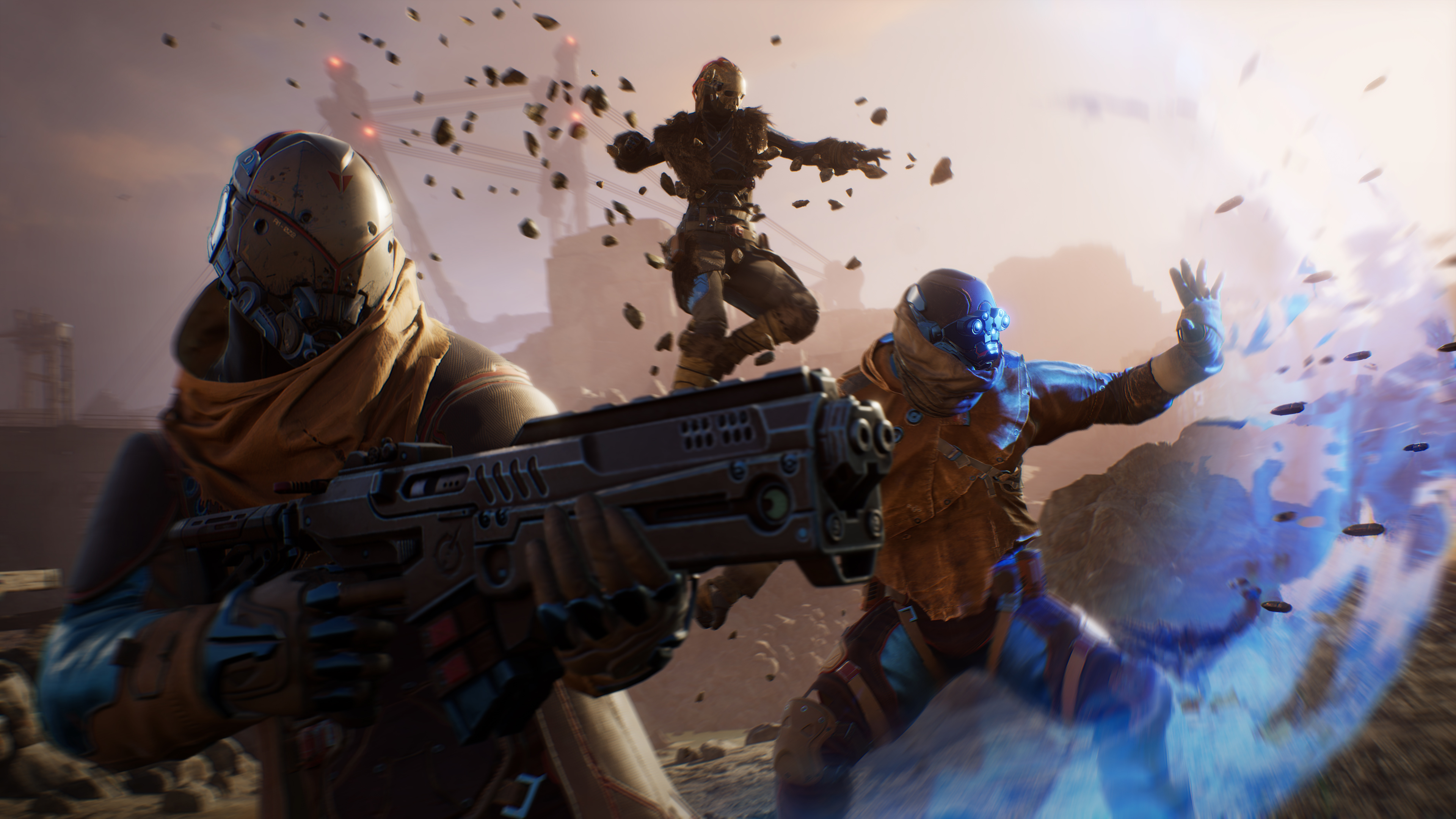
I found a lot to love in Outriders, even in this early showing, but that isn't to say there aren't areas where it has room to grow and improve. The weapons, for example, could feel a bit weightier, as I found many of them lacking that satisfying heftiness that comes with games like Gears of War and Apex Legends. Then again, that might change as you progress further into Enoch. "You start in this very grounded, pre-industrial world war one feel and the weapons are very physical, they're made from scrap," says Rubin, who teases that we may see more powerful and impactful weapons arrive the further you push into the game "You're gonna go into this very weird, alien world and as the anomaly starts getting more and more insane and turning physics upside down." Alien weapons, you say? I'm intrigued.
People Can Fly has focused intently on fine-tuning Outriders' core mechanics and systems, and on delivering a complete story. That, the studio promises, will be available to you straight out of the box- you'll find no limited-time content, seasons, or pay-to-play content here. "For some games, the content coming out later works for them; we're not saying it's a bad thing," says Kmita, who is keen to point out that delivering a complete story was important to People Can Fly. "For us, because we wanted to tell a specific story where the ending is super important, we didn't want to chop the story up and [deliver] it in seasonals or whatever. We wanted to give the complete experience out of the box – we would go the old school way."
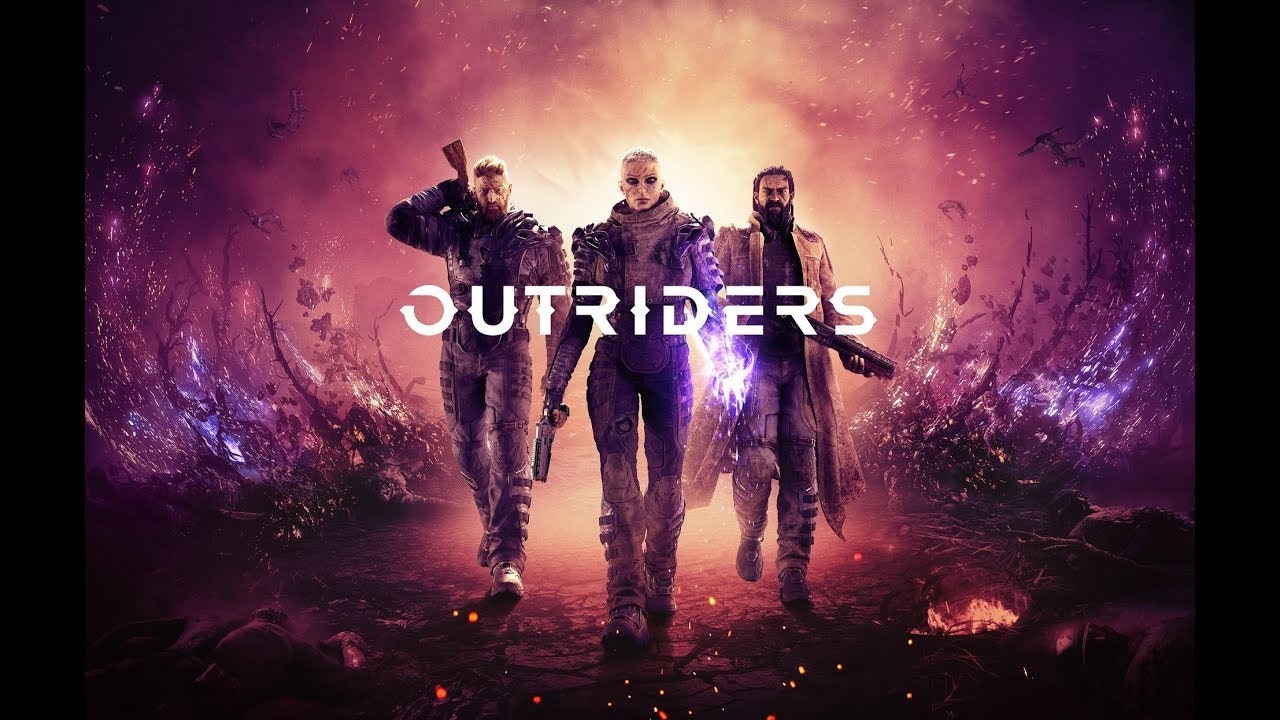
If you want to see what People Can Fly's latest is all about, you'll want to check out this new PS5 and Xbox Series X Outriders trailer.
The fact that Outriders will have no pay-to-play or pay-to-win services will certainly attract those who are tired of shelling out more cash after buying the title. But the lack of any PvP modes or timed events might turn away fans of games as a service - as of right now, it looks like when you're done with Outriders' campaign, you're done. Period. It's hard to avoid comparisons to Destiny, as the in-game menus seem ripped directly from Bungie's shared-world sci-fi title – which is probably why several people asked if the team will add raids or post-campaign content to the game (Kmita's response: "can't say.")
But Destiny is a title that feels a little tired, and one that's still plagued with server issues. Couple that with the similarities of today's popular battle royale games, and you'll find a niche that needs feeling. Outriders is a tight, compact, co-op game that will help usher in the next generation of consoles. It's in a unique position, poised with potential to bowl us over with a killer story and fluid, fun, and fantastical co-op action. I spent three hours on Enoch, and was left wanting more: more access to the branches on my massive skill tree, more weapons to craft and customize, and most importantly, more story. That's saying something, isn't it?
Alyssa Mercante is an editor and features writer at GamesRadar based out of Brooklyn, NY. Prior to entering the industry, she got her Masters's degree in Modern and Contemporary Literature at Newcastle University with a dissertation focusing on contemporary indie games. She spends most of her time playing competitive shooters and in-depth RPGs and was recently on a PAX Panel about the best bars in video games. In her spare time Alyssa rescues cats, practices her Italian, and plays soccer.



